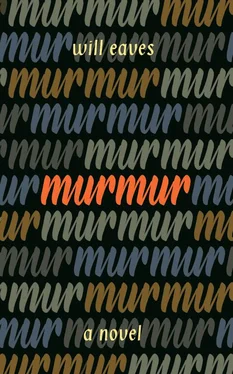Will Eaves

MURMUR
He roves not like a runagate through all the world abroad;
This country hereabout (the which is large) is his abode.
He doth not, like a number of these common wooers, cast
His love to everyone he sees. Thou art the first and last
That ever he set mind upon. Alonely unto thee
He vows himself as long as life doth last. Moreover he
Is youthful and with beauty sheen endued by nature’s gift,
And aptly into any shape his person he can shift.
Thou canst not bid him be the thing, though all things thou shouldst name,
But that he fitly and with ease will straight become the same.
Besides all this, in all one thing both twain of you delight,
And of the fruits that you love best the firstlings are his right,
And gladly he receives thy gifts. But neither covets he
Thy apples, plums, nor other fruits new gathered from the tree,
Nor yet the herbs of pleasant scent that in thy gardens be,
Nor any other kind of thing in all the world, but thee.
—Ovid,
Metamorphoses , Book XIV, trans. Arthur Golding
The world is given but once. Nothing is reflected.
—Erwin Schrödinger, “Mind and Matter” (1956)
PART ONE

JOURNAL
Fear of homosexuals is never far from the surface. The few people who have supported me after my conviction must be very strong-minded. I do not think most people are equipped to associate with pariahs. They have a shadowy sense of how frail they themselves would be in the face of institutional opposition and stigmatization, how utterly cast down if they lost their jobs, if people they knew stopped serving them in shops or looked past them in the street. It is not hatred that turns the majority against the minority, but intuitive shame.
*
Do I need to set down the circumstances? The results are in the papers, and once again I am disinclined to “show my working.” It is strangely more instructive, for me, to imagine other conditions, other lives. But here they are, so that my friends, when they come to these few thoughts, may do likewise.
I had just finished a paper and decided to award myself a pickup. I met the boy, Cyril, on the fairground. He seemed undernourished and shifty but not unengaging; living, he said, in a hostel, working casually. I bought him pie and chips on the grounds and invited him home for the weekend. He didn’t turn up, so I went back to Brooker’s, waited for the fair to close that night, and took him home soon after. He was not unintelligent, I found—he’d liked the boys’ camp in the war, did some arithmetic there, and knew about Mathematical Recreations . Cyril was, I’d say, the product of natural sensitivity, working-class starvation, and nervous debility. He wouldn’t kiss. We treated ourselves to baths and listened to the late repeat of the Brains Trust program on learning machines, with Julius Trentham opining, not implausibly in my view, that the human ability to learn is determined by “appetites, desires, drives, instincts” and that a learning machine would require “something corresponding to a set of appetites.” And I said something like, “You see, what I find interesting about that is Julius’s suggestion that all these feelings and appetites, as he calls them, are causal, and programmable. Even these things, which we’re so sure, so instinctively certain, must be the preserve of freely choosing and desiring humans, may be isolated. They can be caused, and they have a cause.” And Cyril was fascinated. He was listening and nodding. I felt so happy and so peculiarly awful. We went to bed and in the morning I unthinkingly offered him some money. He was offended and left in a mood. I then discovered £3 missing from my wallet—he could have taken it at any time, I put nothing away—and I wrote to him at the hostel, calling things off. He turned up on the doorstep the next day, very indignant, making obscure threats that I did not take seriously. He mentioned an unlikely-sounding suit-hire debt, for £3 of course, and some other outstanding sums and then ended up asking for another £7, which I reluctantly gave him.
A week later, I returned home from the university to find my house broken into, not much taken, £10 from a drawer, some silver plate. I reported the break-in. The police came to the house and fingerprinted it. I also consulted a solicitor in confidence about the possibility of Cyril blackmailing me, and on his advice again wrote to the boy, breaking things off. Cyril subsequently appeared at my house, as before, and this time the threats were not obscure but explicit: he would go to the police and it would come out about the “Professor” and his chums. We had a row, I mentioned the burglary, and he calmed down and kissed me for the first time, and said that he knew who might have done it—his mate from the navy. He admitted having boasted of his friendship with me and I was foolishly flattered. Cyril stayed the night and I went to the police station in the morning with some information about the likely culprit and a rather shoddy story about how I’d come by it. The fingerprints, meanwhile, clearly identified Cyril’s naval friend, who already had a criminal record and needed little prompting to blab about Cyril’s “business” with me.
The King died in the early hours of the day on which two very kind police officers paid me a visit. Seven weeks after my arrest, I was found guilty of gross indecency with a male person and sentenced to receive a course of organotherapy—hormone injections—to be delivered at the Royal Infirmary. The physical effects of those injections have been marked. Almost at once I began dreaming. I do not think deeply about Cyril, it turns out, but about others I think as deeply as anyone can.
*
Things seem to be sadly lost, put to bed, left on top of golden summits in the past, trailing away until we see what the lines of event and memory have traced: a plane. A loop that encloses all loss, has no beginning and no end.
*
I wonder about the coming together of events and people that have produced my crisis. If I were to find a mathematical or topological analogy, I suppose that it would be tessellation—where the contours of one form fit perfectly the contours of another. If I had not finished the paper on morphogenesis when I did, I should not have ventured out in search of a reward. If had not had the upbringing I did have, I should not have thought of sexual relations as a candidate for “reward.” The very interesting Mr. Escher, whose prints have finally awoken my fellow mathematicians to the possibility of an aesthetics of undecidability, has called this coming together the “regular division of the plane,” but it is a little more than that, because it is a division that entails change. The world is not atomistic or random but made of forms that interlock and are always interlocking, like the elderly couple in Ovid who become trees. Time is the plane that reveals this interlocking, though time is not discrete. You cannot pin it down. Very often you cannot see the point at which things start to come together, the point at which cause generates effect, and this is a variant of the measurement problem. It must also be akin to asking at what point we begin to lose consciousness when we are given an anesthetic, or at what point unconscious material becomes conscious. Where does one cross over into the other? If the tessellation of forms is perfect, do they divide? Or are they one?
Читать дальше













